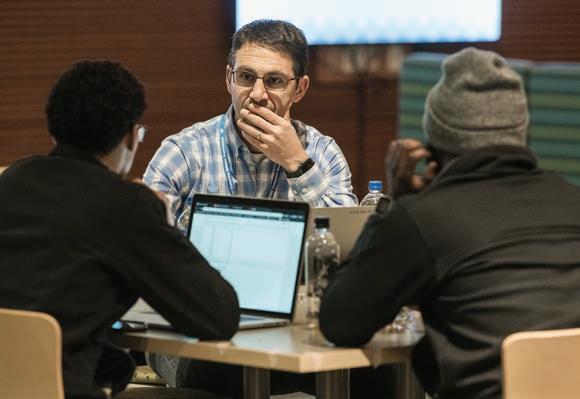
8 minute read
At the Speed of Byte
MTSU’s Data Science Institute and a new degree program could help fulfill middle Tennessee’s demand for data scientists

by Allison Gorman

Once you start thinking of ways autonomous vehicles could change our lives and landscapes, it’s hard to stop. The most-touted benefits— fewer wrecks and less gridlock— are just the beginning. Driverless cars also could make commuters more productive, deliver food to the homebound, and all but eliminate the urban ritual of hunting for a parking spot.
The advantages could be endless— if people trust the technology. But if they don’t want to ride in or share the road with driverless cars, the larger conversation is moot.
MTSU’s Data Science Institute (DSI) is jumpstarting that conversation on campus with a blue Tesla Model X named Blue Raider Autonomous Driving, nicknamed BRAD. By offering free rides in BRAD and tracking rider data, the institute hopes to learn how this promising but controversial technology can earn mainstream acceptance.

Driverless carmakers, like Google subsidiary Waymo, are privately exploring the data too. But DSI Director Charles Apigian, who founded the MTSU institute in 2018, said he wants to bring this kind of research into the public domain. It’s not just about someone’s bottom line. “We’re not tied to Tesla. We’re not tied to Waymo. We’re going to be, hopefully, a trusted source for real passengers,” said Apigian, a professor of Information Systems and Analytics in MTSU’s Jones College of Business.
At a time when corporate abuses of “big data” have given it a bad name, Apigian wants to use data for good. The DSI brings in interdisciplinary teams of faculty and students to analyze data for its own research projects, like BRAD, or to help government agencies and nonprofits operate more effectively. At the same time, it’s providing highly marketable experiences in data science, a profession so sought after that supply can’t meet demand. Driving a Conversation BRAD’s software lets it “learn” continuously; the more it drives, the more autonomous it is. The Data Science Institute acquired the Tesla in the summer of 2018, and it was offering a free shuttle service by February 2019. (No matter how smart BRAD gets, there will always be someone from DSI riding along, Apigian said.)
Analyzing data from pre- and post-ride surveys, as well as from video and audio taken inside BRAD, the institute is looking for patterns in rider behaviors and attitudes, patterns that suggest how driverless technology might win public acceptance.
Do people need the traditional two rows of seats to feel safe, for example, or would they accept a living room configuration? And even if millennials were sold on driverless technology, would older generations ever get on board?
And those are just starting points.
“Our real big pie in the sky is we’re interested in the mobility of human beings,” Apigian said. “The truth is: My car could be picking up groceries for me right now if it’s self-driving. And if it doesn’t have to be parked right by the University, how much space does that alleviate? If you look at downtown Nashville, what percentage is parking lots?”
Asking the Right Questions Hytch, a recent Nashville startup, is tackling traffic in a different way: with a ride-sharing app. Through corporate sponsorships, Hytch pays users for every shared mile they log. In 2018, it became the DSI’s first contract client, asking this question: How much should the financial reward be increased to encourage the use of the Hytch app?
The DSI looked at the data (nothing personal, just trip information like miles and locations) and said: “Wrong question.”
“They were convinced that if they gave people a couple of extra pennies per mile, more people would use it— and that makes sense,” Apigian said. “But the truth is, that’s not why people were using it. What we found is when habits were formed, people continued to use it.” mission to use data for good. So do projects with local government agencies and nonprofits, both of which serve the public interest with limited means.
For example, Apigian has met with the Murfreesboro Police Department to explore how they might use datadriven decisions to improve their processes, be more predictive, and even prevent some corollaries to crime, such as drug overdoses.
The data showed that three months after their first logged ride, 47% of Hytch users were still using the app, he said. But that number jumped to 86% for users who had logged at least 20 rides—a milestone they typically hit in less than three weeks. So the question became: “How can Hytch users be incentivized to get to 20 rides?”
That’s the way data science works, Apigian said. You have to analyze the data to know what you should be asking.

“We presented a full report after a month and a half—that was our deliverable,” he said. “And they liked it so much, they hired us again.”
Shawn Chapman, chief technical officer for Hytch, credits the DSI “superstar team” for providing “professional-level insights and information” that helped him take Hytch to the next level.
“Building a data science team takes time and practice and the right people and experience, but working with MTSU gave me a professional maturity that would have taken me a lot longer to achieve” otherwise, Chapman said.
Within months of the report, Hytch had signed agreements to launch in two new major markets.
Using Data for Good With its eco-friendly objective, the Hytch project fit with Apigian’s That will be an ongoing partnership, as will the DSI’s work with Second Harvest Food Bank of Middle Tennessee. Last January, at MTSU’s fourth annual Hack-MT, Apigian led a team of 25 students who analyzed the food bank’s data and streamlined its warehouse operations.
David Tinsley, a former student of Apigian’s and now senior manager of information systems and information technology for Second Harvest, said the nonprofit faces several challenges at once. Its budget is lean, and its food is often highly perishable. Donations, which come from the general public as well as local grocers, can be unpredictable. And distribution is complex and timesensitive: Second Harvest coordinates with multiple organizations—from Nashville-area churches, schools, and community centers to disaster relief agencies across the country— to get food to hungry people as quickly as possible.
As a one-man department, Tinsley can’t make the best use of the data he has, so he plans to bring in MTSU students to work on data-driven projects. Through internships, they would gain real-world experience and he would gain a real understanding of where Second Harvest is and where it needs to be.
Filling a Need Businesses of all types have reached a similar conclusion. Data science has become critical to virtually every industry, from health and agriculture to journalism and linguistics, Apigian said.
That’s why both the Data Science Institute and Apigian’s proposed undergraduate degree in Data Science (see sidebar) are interdisciplinary. They reflect how far the use of data has expanded beyond traditional STEM fields.
“I want to create storytellers just as much as I want to create number-crunchers—people who can look at data and be able to convince somebody of something or just be able to tell the truth behind data,” Apigian said. “Employers tell us that’s just as important as understanding algorithms.” Faker Zouaoui, chief analytics officer for mobile tech support company Asurion and winner of the Nashville Technology Council’s 2018 data scientist of the year award, said data analysts serve a very different role today than they did 20 years ago.
“They worked on futuristic problems,” Zouaoui said. “They were not seen as people that could help drive growth and innovation in everyday business. But that’s not the case anymore.” Analytics is now built into a business’s skill set, rather than an outside tool that’s brought in, he said. Companies are using data “from the back room to the boardroom” to continuously shape their products and business strategies.
That’s why data scientists are in demand throughout the country, including in middle Tennessee. In a November 2018 op-ed in The Tennessean, Zouaoui highlighted the need for data scientists in Nashville, a booming city with a fast-growing tech market. “For every data scientist employed in the region,” he wrote, “there’s at least one more open position that employers are actively seeking to fill.”
At MTSU, Apigian is building a pipeline to supply that need. MTSU

A Highly Marketable Degree Data scientists are in high demand. MTSU’s recently approved new Bachelor of Science in Data Science is the first undergraduate program of its kind in Tennessee. That’s an important distinction, said Professor Charles Apigian, who helped design the curriculum. “The idea of an undergraduate degree is not to make data scientists. It’s to get students extremely excited for technology and data,” he said. “If they want to become data scientists, they can get their graduate degree. But this will give them the foundational skills to get a lot of different jobs.”

Because data science lives in every industry, this degree won’t live in any academic college. Created with input from Nashville’s top data scientists, it incorporates computer science, math, information systems, economics, and finance, among other disciplines. “I’m amazed by how all the pieces fit together,” Apigian said. “We only added four new classes. Because we already have data science here; we just haven’t brought it all together.”
No. 1 “Best Jobs in America” fourth straight year by Glassdoor
$108,000 median base annual salary
Software development/tech occupation postings: Rose 23% in 2½-year timeframe At 99% of 2018 volume halfway into 2019
(Source: New MTSU report)










